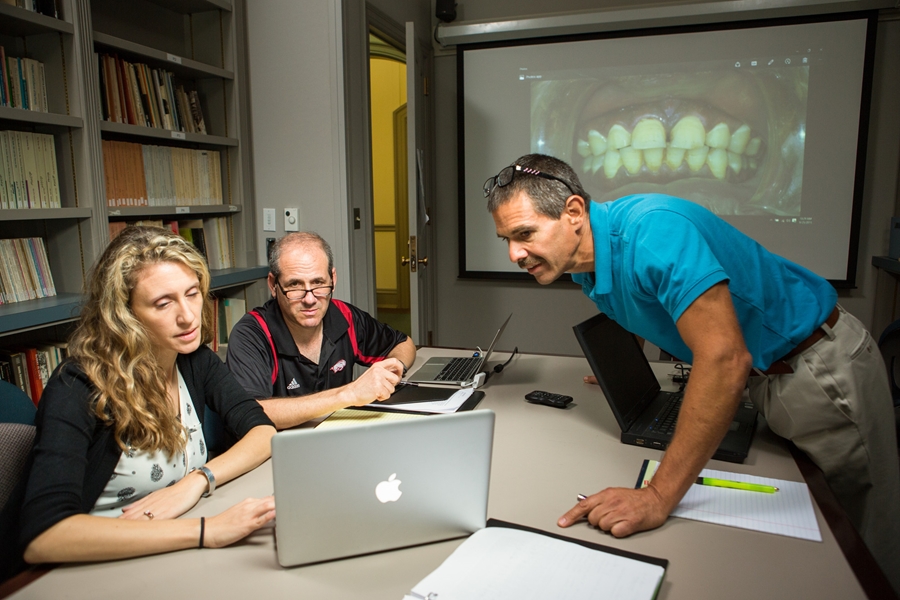Relationship Between Oral Health and Shift from Wild to Agri Diets is Nuanced

From left, Alyssa Crittenden, Lincy Assistant Professor of anthropology at UNLV, Peter Ungar, Distinguished Professor of anthropology at U of A and John Sorrentino, dentist.
FAYETTEVILLE, Ark. – Findings from the first comprehensive study on the oral health of a population in transition from a foraging, wild-food diet to an agriculture-based diet indicate that oral health is affected not just by diet, but also by gender and behavior differences between men and women.
Peter Ungar, Distinguished Professor of anthropology at the University of Arkansas, and Alyssa Crittenden, Lincy Assistant Professor of anthropology at the University of Nevada, Las Vegas, worked with New York dentist, John Sorrentino, on the research published today in the journal PloS One.
“The transition from hunting and gathering to agriculture is routinely associated with a decline in oral health,” Ungar said, “because of increased consumption of carbohydrates and growth of bacterial colonies in dental plaque linked to the development of tooth decay.”
The team studied the oral health of the Hadza, a population in Tanzania that is in transition from a foraging, wild-food lifestyle to agricultural food consumption and identified several variables that could influence tooth decay and periodontal disease, from sex differences in diet to smoking habits.
All foragers in the study exhibited some degree of cavities, periodontal disease and gross wear on teeth, indicating that there were more factors involved in their oral health than just whether people were living in the bush or a village setting.
“Our results show that a person’s sex and where they live really influences how healthy their teeth are,” Crittenden said. “Comparing Hadza village camps to bush camps shows major difference, but only when you break out the sample by biological sex. Living in the same environment, with access to the same resources, men and women show different dietary patterns. Understanding how these patterns play out among the Hadza can inform our understanding of how they played out in prehistory.”
Men living on wild diets in the bush – who eat large amounts of honey and smoke more — had the worst teeth in the study, while women living on wild diets in the bush had the best oral health. Conversely, women living on agricultural diets in the villages had the worst oral health while men in the same conditions had the healthier teeth and gums.
The discovery that men and women in the same environment, with the same resources available to them, had different levels of oral health raises questions about conventional wisdom concerning the effects of the transition from hunting and gathering to an agricultural lifestyle on oral health. The team plans to study further each factor in the Hadza transitional population, from diet to behavior and life history.
About the University of Arkansas: The University of Arkansas provides an internationally competitive education for undergraduate and graduate students in more than 200 academic programs. The university contributes new knowledge, economic development, basic and applied research, and creative activity while also providing service to academic and professional disciplines. The Carnegie Foundation classifies the University of Arkansas among only 2 percent of universities in America that have the highest level of research activity. U.S. News & World Report ranks the University of Arkansas among its top American public research universities. Founded in 1871, the University of Arkansas comprises 10 colleges and schools and maintains a low student-to-faculty ratio that promotes personal attention and close mentoring.
Contacts
Peter Ungar, Distinguished Professor of Anthropology
J. William Fulbright College of Arts and Sciences
479-575-6361,
pungar@uark.edu
Francis McCabe, media relations specialist
University of Nevada - Las Vegas
702-895-5515,
francis.mccabe@unlv.edu
Amy Schlesing, director of strategic communication
University Relations
479-575-3033,
amys@uark.edu
Headlines
Four Students Named Goldwater Scholars; Two Earn Udall Honorable Mentions
Four U of A students have received the prestigious Goldwater Scholarship, an award for top students in mathematics, science, and engineering.
Cross-Campus Collaboration Culminates in New Outdoor Geological Installation
Grand opening event to celebrate the new GeoLab installation at the U of A’s Gearhart Hall courtyard is set for May 3. The installation will be open to the public year-round.
First Students to Use Online Degree to Hone Nursing Leadership, Elevate Patient Care
Hanna Baxendale and Wendi Kimbrell will begin coursework in the Doctor of Nursing Practice-Executive Master of Business Administration program offered by the Eleanor Mann School of Nursing and Walton College.
Join the Office for Sustainability on a Final Cruise to Campus
Cruise to Campus Wednesdays have fostered a gathering space for individuals interested in biking to campus. Drop by the Old Main Lawn from 7:30-10 a.m. Wednesday for coffee, something to eat and conversation.
Fay Jones School Student Ambassador Program Gives Voice to Design Students
The student ambassador program at the Fay Jones School of Architecture and Design is built to connect top design students with their school, its alumni, its future students and others inside and outside the school.




